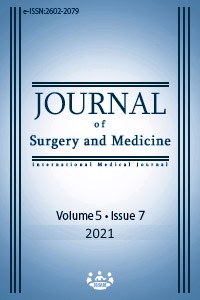The role of sonoelastography in the evaluation of hepatic fibrosis in pediatric patients
Keywords:
Liver cirrhosis, Sonoelastography, Hepatic fibrosisAbstract
Background/Aim: Hepatic fibrosis is caused by excessive accumulation of collagen-containing extracellular matrix proteins in chronic liver diseases. The gold standard for determining the degree of liver fibrosis is liver biopsy, which is an invasive method with complication risks. This study aimed to evaluate the potential role of ultrasound elastography, a non-invasive method, in the assessment of hepatic fibrosis among pediatric patients. Methods: Twenty-four pediatric (0-18 years) patients with chronic liver disease and suspected hepatic fibrosis were included in this study. All patients were evaluated with B-mode and sonoelastography using Hitachi EUB 7500 digital ultrasound equipment. The biopsy procedure was performed on all patients a week after sonoelastography. Elastographic scores of liver parenchyma were categorized into four main groups, nonfibrotic, mild, moderate, and severe fibrosis. Strain index values were calculated. The elastographic scores and mean strain index values of the liver parenchyma were correlated with their pathological diagnosis. Results: Elastographic scores and strain index values were significant for the presence of hepatic fibrosis (P=0.001 and P=0.006 respectively). Elastography has 100% sensitivity and 83.3% specificity to distinguish hepatic fibrosis when the cut-off value of strain index is 1.03. Conclusion: Our findings support that real-time elastography is a non-invasive method for the diagnosis and staging of hepatic fibrosis with the potential to prevent recurrent biopsy and complications.
Downloads
References
Kanamato M, Shimada M, Ikegami T, Uchiyama H, Imura S, Morine Y, et al. Real time elastography for noninvasive diagnosis of liver fibrosis. Pancreat Surg. 2009;16:463-7.
Sherman KE, Goodman ZD, Sullivan SD, Faris-Young S. Liver biopsy in cirrhotic patients. Am J Gastroenterol. 2007;102:1-5.
Afdhal NH, Nunes D. Evaluation of liver fibrosis: a concise review. Am J Gastroenterol. 1999;6:1160–74.
Shackel NA, McCaughan GW. Liver biopsy: is it still relevant? J Intern Med. 2004;36:689-91.
Poynard T, Munteanu M, Bismut FI, Charlotte F, Thabut D, Calvez SL, et al. Prospective analysis of discordant results between biochemical markers and biopsy in patients with chronic hepatitis C. Clin Chemistry. 2004;50:1344–55.
Choong CC, Venkatesh SK, Siew EP. Accuracy of routine clinical ultrasound for staging of liver fibrosis. J Clin Imaging Sci. 2012;2:58.
Ginat DT, Destounis SV, Barr RG, Castaneda B, Strang JG, Rubens DJ, et al. US Elastography of Breast and Prostate Lesions. RadioGraphics. 2009;29:2007–16.
Ophir J, Kallel F, Varghese T, Alam SK, Krouskop T, Garra BS, et al. Elastography. Optical and Acoustical Imaging of Biological Media. 2001;4:1193–212.
Fujimoto K, Wada S, Oshit M. Noninvasive Evaluation of Hepatic Fibrosis in Patients with Chronic Hepatit C Using Elastography. Medix Suppl. 2007;Suppl:24-7.
Bravo AA, Sheth SG, Chopra S. Liver biopsy. N Engl J Med. 2001;344:495-500.
Aydın O, Yıldız L, Kefeli M, et al. Kronik viral hepatitlilerde ihsak modifiye histolojik aktivite indeksinin tek gözlemci ve gözlemciler arası tekrarlanabilirliliği. Türk Patoloji Dergisi 2005;21:58-61.
Bataller R, Brenner DA. Liver Fibrosis, J Clin Invest. 2005;115:209-18.
Guyot C, Lepreux S, Combe C, et al. Hepatic fibrosis and cirrhosis: The (myo) fibroblastic cell subpopulations involved. Int J Biochem Cell Biol. 2006;38:135–51.
Poynard T, Bismut IF, Munteanu M, et al. Biomarkers as non-invasive assessment of hepatic fibrosis in chronic hepatitis C. J Gastroenterol Hepatol. 2004;19:236–45.
Rossi E, Adams LA, Bulsara M, et al. Assessing liver fibrosis with serum marker models. Clin Biochem Rev. 2007;28:3-10.
Nishiura T, Watanabe H, Ito M. Ultrasound evaluation of the fibrosis stage in chronic liver disease by the simultaneous use of low and high frequency probes. Br J Radiol. 2005 Mar;78(927):189-97.
Gaiani S, Gramantieri L, Venturoli N, Piscaglia F, Siringo S, D'Errico A, et al. What is the criterion for differentiating chronic hepatitis from compensated cirrhosis? A prospective study comparing ultrasonography and percutaneous liver biopsy. J Hepatol.1997;27:979-85.
DiLeilo A, Cestari C, Lomazzi A, et al. Cirrhosis: Diagnosis with sonographic study of liver surface. Radiology. 1989;172:389-92.
Ophir J, Alam SK, Garra BS, Kallel F, Konofagou EE, Krouskop T, et al. Elastography imaging the elastic properties of soft tissues with ultrasound, Jonathan J Med Ultrasonics. 2002;29:155-71.
Friedrich-Rust M, Ong MF, Herrmann E, et al. Real-time Elastography for Noninvasive Assessment of Liver Fibrosis in Chronic Viral Hepatitis. Am J. Roentgenol. 2007;188:758-64.
Morikawa H, Fukuda K, Kobayashi S, et al. Real-time tissue elastography as a tool for the noninvasive assessment of liver stiffness in patients with chronic hepatitis C. J Gastroenterol. 2011;46:350–8.
Deurdulian C, Grant EG, Tchelepi H, Latterman PT, Paluch JT, Chopra S, et al. Assessment of Fibrosis in Liver Transplant Recipients: Diagnostic Performance of Shear Wave Elastography (SWE) and Correlation of SWE Findings With Biopsy Results. American Journal of Roentgenology. 2019;213:264-71.
Fu J, Wu B, Wu H, Lin F, Deng W. Accuracy of real-time shear wave elastography in staging hepatic fibrosis: a meta-analysis. BMC Med Imaging. 2020;20;16.
Venkatesh SK, Yin M, Ehman RL. Magnetic resonance elastography of liver: clinical applications. J Comput Assist Tomogr. 2013;37:887–96.
Downloads
- 169 256
Published
Issue
Section
How to Cite
License
Copyright (c) 2021 Erkan Bilgin, Ezel Yaltırık Bilgin, Suna Özhan Oktar
This work is licensed under a Creative Commons Attribution-NonCommercial-NoDerivatives 4.0 International License.
















